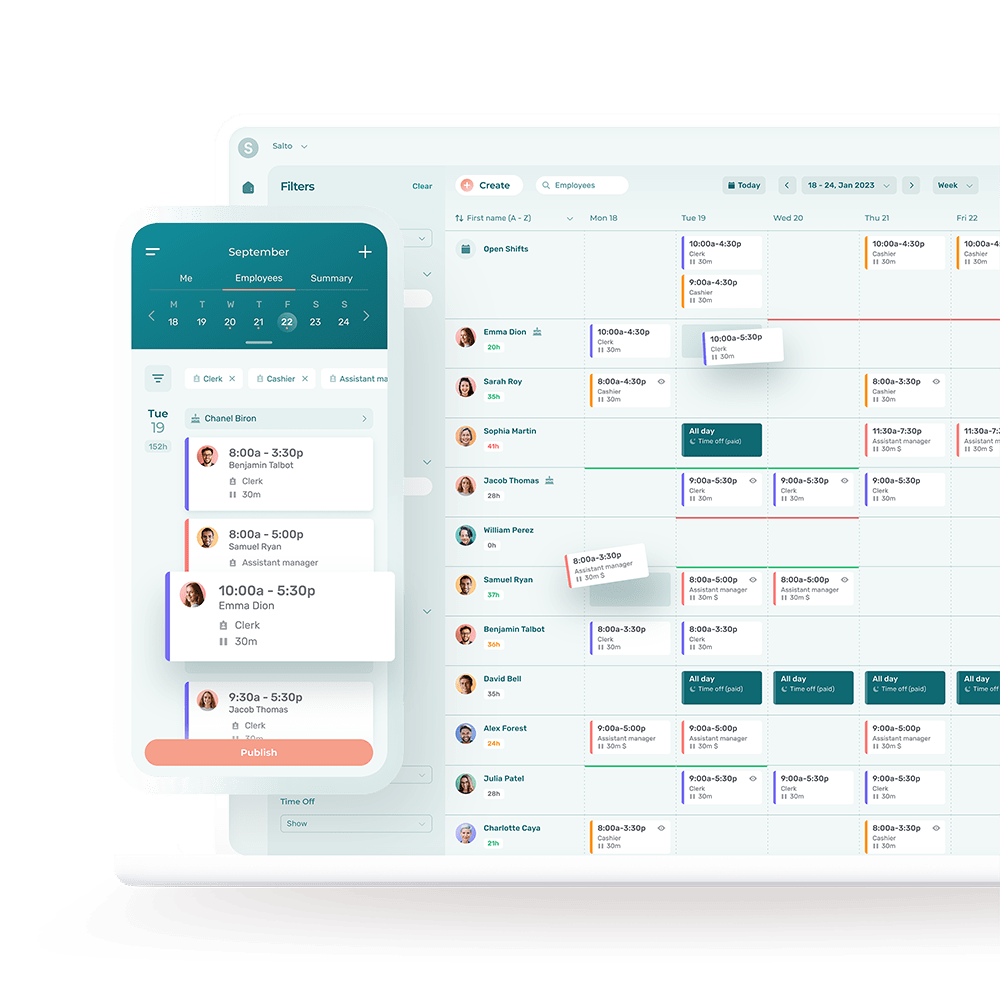Your corporate culture directly shapes the experience of your employees, customers, and even suppliers.
It’s often that je ne sais quoi that makes a company stand out from its competitors.
But what is it, concretely speaking?
Corporate culture, also known as organizational culture, is the set of beliefs, values and attitudes of a company.
As such, it influences management decisions, employee behaviour, and the employer’s reputation.
When a company has a strong corporate culture, employees develop a greater sense of solidarity with and loyalty to their employer. Corporate culture also positively impacts employee motivation and satisfaction, which in turn drives retention and productivity.
Corporate culture is also an important strategic tool. An authentic corporate culture is a valuable asset for recruitment, in addition to guiding business leaders in the various decisions they need to make.
How to Build a Corporate Culture
A corporate culture isn’t created overnight. It takes shape over time, in pace with the organization’s actions and decisions.
Corporate culture is built around several aspects, such as the company’s:
- History (founders, challenges, key moments, etc.);
- Customs and traditions (welcome and onboarding, milestones, etc.);
- Dress code;
- Values;
- Power relationships and hierarchy;
- Working methods;
- Work premises; and
- Language.
Here are a few ideas to help you build or strengthen your corporate culture.
1. Uphold Your Values
All organizations have values, whether implicit or explicit, that are reflected in their operations. As a result, it’s important to define them in order to ensure that they guide all your decisions.
No one value is superior to any other, as long as they are authentic. A few examples might include:
- Innovation;
- Teamwork;
- Respect;
- Performance.
Be sure to pick just a few—only the most important ones. When it comes to values, less is more. You should be able to easily remember them.
2. Clarify Your Mission
All companies seek to be profitable. But beyond financial concerns, what is your organization’s mission?
- Making management about people first;
- Providing quality care for seniors;
- Utilizing local products to help promote local artisans;
- Promoting an environmentally friendly lifestyle.
A company’s mission is its reason for being, i.e., what distinguishes it from others. It guides management decisions and inspires employees to give the job their best.
3. Put On Parties That Bring Everyone Together
Organizing fun and inclusive events can go against what many people think of as work. I am not recommending that you have a party with your employees every Thursday, but to organize evenings that will serve as milestones.
In a previous job at a big company, the Christmas party was an event not to be missed. The employees talked about the party for months beforehand—they couldn’t wait! Everyone in attendance described it as magical, from the delicious food to the amazing gifts, splendid location, and more.
This tradition was one of the hallmarks of the company’s culture and greatly contributed to employees’ satisfaction. The staff felt recognized and appreciated by the management team, who pulled out all the stops to make the night a success. It goes to show that one party can really make a difference.
4. Offer Flexible Work Hours
Yes, it is possible for any company to offer flexible work hours.
Despite what many people think, offering your employees some flexibility does not mean letting them choose their own schedule. It means asking them about their preferences and factoring in that they also have lives outside of work. A few examples include:
- Letting employees trade shifts;
- Not making staff work every weekend;
- Allowing employees to change their availability several times a year.
Offering flexible work hours helps significantly boost employee satisfaction and motivation.
5. Offer Attractive Discounts to Employees
Offering employee discounts is a common practice in many industries. Even so, we often underestimate the impact of these perks on team members.
A friend of mine worked for a small outdoor company for years. He could have easily made a lot more money elsewhere, but he much preferred to stay at this job. Why? Because he had access to incredible equipment at a nominal cost. To him, this perk was priceless.
6. Organize Paid Team Activities
Paid team activities are often much loved by employees, enabling them to connect with one another and bask in thanks for their good work.
There are oodles of affordable ideas that you can try out with your team.
7. Make Recognition an Everyday Occurrence
It can’t be said enough that thanking your employees is super important, and there are a myriad of ways to do so, such as:
- Setting up a “thanks system” between co-workers;
- Taking the time to highlight employees’ achievements at team meetings;
- Regularly praising employees for their good work; and
- Celebrating birthdays.
8. Creating a Welcoming Workplace
According to a number of experts, there is a link between employee motivation and satisfaction, on the one hand, and the appearance and atmosphere of their workplace, on the other. We spend so much time at work that being comfortable there becomes essential. It goes without saying that it is much more motivating to work in a nice, clean space than somewhere unkempt.
If necessary, do some minor renovations to make your workplace more attractive. A little paint, decoration and cozy furniture can go a long way.
9. Use Efficient Work Tools
If you want your employees to do their best work, you need to give them the right tools for the job. As an added bonus, offering quality tools shows that you care about your employees’ well-being and satisfaction.
For example, get schedule management software to make it easier for employees to swap shifts and change their availability. This will make scheduling much easier and therefore boost efficiency.
At Agendrix, we have decided to furnish our office with high-end chairs. Our employees spend most of the day at their desks, so it’s not a luxury to provide comfortable seating.
10. Establishing a Quality Onboarding and Integration Process
The way an employee is welcomed leaves a lasting impression of their new employer. The arrival of a new recruit should always be an important event.
Onboarding and integration are a perfect time to establish your corporate culture.
- Take the time to welcome newcomers by not overloading their schedule;
- Do a team activity so that everyone can get to know each other quickly;
- Offer a small token of welcome (reusable water bottle, baseball cap, paid lunch, etc.).
11. Have Regular One-On-One Meetings
One-on-one meetings are a classic and valuable way for managers to create closer ties with their employees. They are also ideal for giving feedback and dealing with irritants.
If you want to have a more person-centred culture, one-on-one meetings are great as they will allow you to demonstrate that you really care about your employees.
12. Create Traditions
Friday pizza lunch, team dinner, Monday chat, annual summer party—traditions of all sizes help build a strong corporate culture. This is what will make your employees feel like they are part of a cohesive team.
13. Offer Better Perks
Beyond conventional benefits (insurance, RRSP contribution, sick leave, etc.), it may be worthwhile to offer something more to your employees. These small gestures make you stand out as an employer and will increase your employees’ satisfaction.
For example, you could offer:
- A low-cost healthy menu at the cafeteria;
- Free snacks;
- Complimentary coffee and tea;
- Promotional items featuring the company’s image;
- A budget to encourage physical activity; or
- More weeks off per year.
14. Adopt a Modern, Comfortable and Aesthetic Dress Code
A lawyer will dress very differently than a grocery store clerk. This is to be expected, given that the context and corporate culture in these two places is not the same.
Whether uniform or no uniform, business casual or dressy, the dress code is a direct reflection of a company’s culture—the choice is important.
Choose a dress code that meshes with your company’s brand image and takes into account your employees’ well-being.
Every Gesture Counts
Building a strong corporate culture is not overly complicated. It is simply a matter of being guided by your values and making decisions in alignment with your mission.
Even the smallest gesture can have a big impact.










